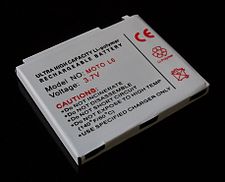
Back بطارية بوليمرات الليثيوم Arabic Bateria d'ió liti en polímer Catalan Lithium-polymerový akumulátor Czech Lithium-Polymer-Akkumulator German Batería de polímero de litio Spanish Liitiumpolümeeraku Estonian باتری لیتیم پلیمر Persian Litiumpolymeeriakku Finnish Litij-polimer baterija Croatian Baterai polimer litium ID
 A lithium polymer battery used to power a smartphone | |
| Specific energy | 100–265 W·h/kg (0.36–0.95 MJ/kg)[1] |
|---|---|
| Energy density | 250–670 W·h/L (0.90–2.63 MJ/L)[1] |
A lithium polymer battery, or more correctly, lithium-ion polymer battery (abbreviated as LiPo, LIP, Li-poly, lithium-poly, and others), is a rechargeable battery of lithium-ion technology using a polymer electrolyte instead of a liquid electrolyte. Highly conductive semisolid (gel) polymers form this electrolyte. These batteries provide higher specific energy than other lithium battery types. They are used in applications where weight is critical, such as mobile devices, radio-controlled aircraft, and some electric vehicles.[2]
- ^ a b "Lithium-Ion Battery". Clean Energy Institute. Retrieved 6 January 2022.
- ^ Bruno Scrosati, K. M. Abraham, Walter A. van Schalkwijk, Jusef Hassoun (ed), Lithium Batteries: Advanced Technologies and Applications, John Wiley & Sons, 2013 ISBN 1118615395,page 44
© MMXXIII Rich X Search. We shall prevail. All rights reserved. Rich X Search